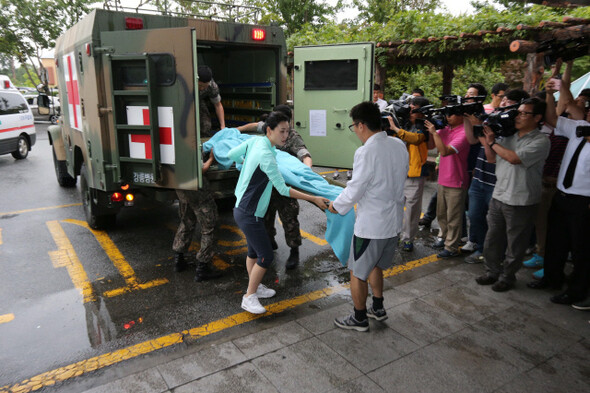hankyoreh
Links to other country sites 다른 나라 사이트 링크
Ministry: one in five soldiers require “special attention”

By Kim Oi-hyun, staff reporter
The Ministry of National Defense is raising eyebrows with its announcement that one in five troops is classified as a “requiring special attention.”
Speaking at a June 23 morning briefing on a recent incident in which a soldier identified by his surname Lim fatally shot five colleagues, ministry spokesman Kim Min-seok explained, “The 22nd Infantry Division [where Lim worked] has around 1,800 troops listed as ‘requiring special attention’ in the three categories of A, B, and C, or about 20% of all troops.”
Kim went on to say, “They’re not all clustered in the 22nd Division. There’s just generally a lot of soldiers that require attention.”
When asked by a reporter if the issue extended throughout the military, Kim said, “I believe the rate is similar [around 20%] for the military as a whole.”
Speaking in a phone interview with the Hankyoreh the same day, an officer with experience in the 22nd Division explained on condition of anonymity, “A single company [of about 120] may have around two to three in Class A and four to five in Class B. If you also include Class C, which is all new troops who’ve been there under 100 days, it comes out to the equivalent of one platoon [30 to 40 troops] per battalion [around 500] who are classified as needing ‘special attention.’”
What is not clear is whether the designated soldiers are actually getting that special attention. Posts on various online message boards since Lim’s shooting spree suggest that personality testing practices are lax. Some report a lack of consistency between units, while others mention a half-hearted approach to the handling of “special attention” troops. In one case, a training sergeant reportedly assembled recruits who had received a failing grade in training center testing and asked them to “raise their hand if you think you’re going to have a difficult time in the military.” When none did, all of them were sent into training, the source said.
The standards of classification are also unclear. A former officer admitted, “Even if there aren’t any, they tell you to ‘make some up and report on them.’”
If true, this would suggest a pro forma system where different units pad their special attention numbers and do a “report for reporting’s sake” to superiors.
The standards for classification give some hints of this. According to a criterion sheet released by the Ministry on June 23, troops from single-parent families (“broken households,” in the military’s terminology) and the economically impoverished immediately receive Class B ratings, which calls for “focused attention.” Sexual minorities (“homosexuals”) are classified as Class C, requiring basic management. No clear standards are given for why any of the three groups should be considered as “requiring special attention.”
Please direct questions or comments to [english@hani.co.kr]

Editorial・opinion
![[Column] Season 2 of special prosecutor probe may be coming to Korea soon [Column] Season 2 of special prosecutor probe may be coming to Korea soon](https://flexible.img.hani.co.kr/flexible/normal/500/300/imgdb/original/2024/0426/3317141030699447.jpg) [Column] Season 2 of special prosecutor probe may be coming to Korea soon
[Column] Season 2 of special prosecutor probe may be coming to Korea soon![[Column] Park Geun-hye déjà vu in Yoon Suk-yeol [Column] Park Geun-hye déjà vu in Yoon Suk-yeol](https://flexible.img.hani.co.kr/flexible/normal/500/300/imgdb/original/2024/0424/651713945113788.jpg) [Column] Park Geun-hye déjà vu in Yoon Suk-yeol
[Column] Park Geun-hye déjà vu in Yoon Suk-yeol- [Editorial] New weight of N. Korea’s nuclear threats makes dialogue all the more urgent
- [Guest essay] The real reason Korea’s new right wants to dub Rhee a founding father
- [Column] ‘Choson’: Is it time we start referring to N. Korea in its own terms?
- [Editorial] Japan’s rewriting of history with Korea has gone too far
- [Column] The president’s questionable capacity for dialogue
- [Column] Are chaebol firms just pizza pies for families to divvy up as they please?
- [Column] Has Korea, too, crossed the Rubicon on China?
- [Correspondent’s column] In Japan’s alliance with US, echoes of its past alliances with UK
Most viewed articles
- 1[Column] Season 2 of special prosecutor probe may be coming to Korea soon
- 2No good, very bad game for Korea puts it out of Olympics for first time since 1988
- 3‘We must say no’: Seoul defense chief on Korean, USFK involvement in hypothetical Taiwan crisis
- 4Korea’s 1.3% growth in Q1 signals ‘textbook’ return to growth, says government
- 5Division commander ordered troops to enter raging flood waters before Marine died, survivor says
- 6Is N. Korea threatening to test nukes in response to possible new US-led sanctions body?
- 7Is Japan about to snatch control of Line messenger from Korea’s Naver?
- 8[Editorial] In the year since the Sewol, our national community has drowned
- 9[Editorial] 10 years on, lessons of Sewol tragedy must never be forgotten
- 10[Editorial] New weight of N. Korea’s nuclear threats makes dialogue all the more urgent